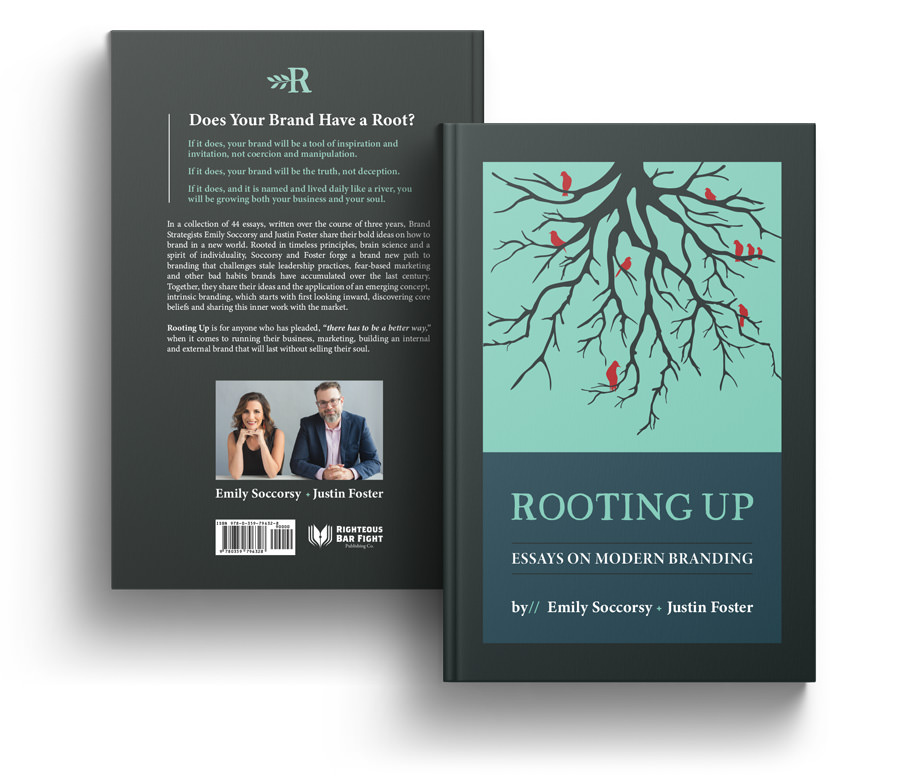Filed Under: 21st Century Branding, Beliefs-Based Branding, Intrinsic Branding, Leadership, Marketing
By Emily Soccorsy + Justin Foster
One of the greatest pains of modern thinking is our addiction to dualism.
While we are used to seeing this us-versus-them, black-or-white approach in politics or religion, it’s also incredibly prevalent in businesses.
This is where we encounter it the most.
Too many Old World leaders still believe that for-profit companies should be run with lightning fast scaling, compounding profit (and shareholder value) as the organizational heartbeat and driving force. Branding and marketing have the job of reinforcing this strategy – often at the expense of truth.
It is our belief business, and capitalism, can be both for good and for profit. These are the people we are here to work with.
Holding these two realities in equal stead means branding and marketing needs to be organized around reflecting leaders and cultures that are striving to embody this rising reality.
That’s why it was with decided glee we read the March special edition of Forbes adorned with its standard-bearing bright white font proclaiming, “Reimagining Capitalism.” In the wake of vast economic expansion and an increasingly disillusioned population, capitalism is under nearly unprecedented scrutiny.
In light of the New World consciousness, however, leaders are not pushing back or turning away in indifference. (And given life in the tech age, it would be impossible to hide.) Instead, a new breed of leader is stepping forward and calling forth a next generation understanding of the concept of capitalism (Examples: Daniel Lubetsky, Bill and Melinda Gates, Steve Case, Warren Buffett). In his cover article, Forbes editor Randall Lane states that “the time is ripe to reimagine” the system of capitalism — and after interviewing two dozen billionaires over the last year as well as picking the brains of some of the quintessential American Dreamers (bootstrappers and immigrants turned Forbes 400 richest Americans), he posits this system will be built upon the ideas of authenticity, accessibility and accountability.
We see this movement toward a kinder, gentler capitalism at the grassroots level.
Over the last year, our business has attracted more than a dozen leaders who are seeking to root into their mission and make it the center of their business. They come to us from every industry: clothing, manufacturing, logistics, tech and more.
They do so not to claim a market position or sell more products, but to pronounce their intention to change the world with their work, beginning with themselves and quickly extending to the people around them, including, eventually, their clients.
Brands that are organizing around their mission and not their business model have a unique branding and marketing problem: the old ways don’t work.
Old world marketers most often adopt a revised version of the classical 4 Ps: price, promotion, place and, of course, profit. You can also add a 5th P: positioning. All of these were necessary, and if executed properly, effective tools in the dualistic battle for market share.
These old Ps can hurt a mission-centric, New World brand. Selling on price, and not addressing the human, emotional, connection, cheapens the experience. Over-pitching and over-promoting comes across as either sanctimonious or desperate. Place has shifted drifted dramatically as a differentiator. And positioning to own a place in the mind has been replaced by owning a category in the consciousness.
New World brands don’t just have customers, employees and vendors — they have believers.
Branding and marketing must take this special role into consideration. Rather than using the Old World levers of manipulation, persuasion or coercion, a New World marketer will take an approach that honors, invites and grows the believer base. The result of these efforts are the inspiration of one’s audience and the voluntary opting-in of the audience to the brand’s mission.
New capitalism brands ask, rather than tells. They invite their audience to participate, rather than repetitively collecting NPS ratings. As a result, their audience of believers are a thriving, organic hive of feedback loops, innovative ideas, and creative thinking. Their collective consciousness is the spirit of the brand.
In a New World of Reimagined Capitalism, being for-profit and for-good are sympathetic and complementary ideas that help to elevate economic ventures and that increase the vitality of the human spirit. These leaders defiantly push back against the Old World pressure – to trade soul for investment, to lower quality and experience standards, to use manipulative marketing tactics to falsely boost sales.
New World Capitalists understand this idea because these rising socially conscious brands see the humanity in all they do.
The leaders of these organizations put humans at the middle of their endeavors — then support that endeavor with practices, processes and systems. To put the human in the middle requires leaders connected to their own humanity. Those who are willing readily accept the promise that doing so will lead to profitability.
Emily Soccorsy + Justin Foster are cofounders of the intrinsic branding practice known as Root + River. Together with their defiantly different clients, they uncover then articulate the foundational elements of the brand. Then, they provide brand strategy and brand coaching as the brand is rolled out internally and externally. Obsessive about language and differentiation, Emily + Justin are also authors and speakers. Follow @rootandriver @fosterthinking and @emilyatlarge.
